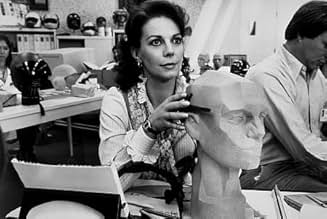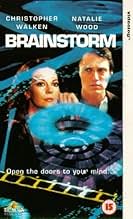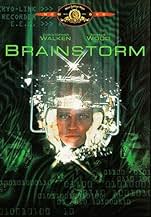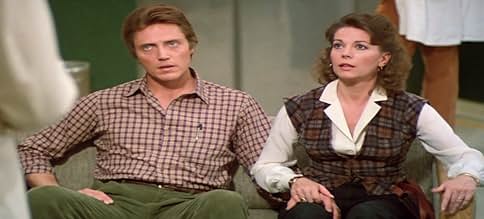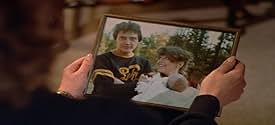Os pesquisadores desenvolvem um sistema em que podem entrar na mente das pessoas. Mas quando as pessoas envolvidas trazem seus problemas pessoais para a equação, isso torna-se perigoso - tal... Ler tudoOs pesquisadores desenvolvem um sistema em que podem entrar na mente das pessoas. Mas quando as pessoas envolvidas trazem seus problemas pessoais para a equação, isso torna-se perigoso - talvez mortal.Os pesquisadores desenvolvem um sistema em que podem entrar na mente das pessoas. Mas quando as pessoas envolvidas trazem seus problemas pessoais para a equação, isso torna-se perigoso - talvez mortal.
- Direção
- Roteiristas
- Artistas
- Prêmios
- 2 vitórias e 6 indicações no total
- Barry
- (as David Wood)
- Realtor
- (as Mary-Fran Lyman)
- Direção
- Roteiristas
- Elenco e equipe completos
- Produção, bilheteria e muito mais no IMDbPro
Avaliações em destaque
Most sci-fi films based on technology don't age well, and there are times where this is no exception. The idea of recording on tape, let alone making tape loops, must seem like wax cylinder recordings to today's MP3 generation. The tapes themselves were props borrowed from a film being shot nearby, and that film was itself a dismal failure. But the concept is timeless, and so well done that, all in all, the film still works as well as it did in 1983.
Lesser screenplays would have been content with the main story line; scientists invent a way to record brainwaves and play them back for a real life out of body experience, and for just such a stinker, check out Strange Days. But then along comes the incomparable, utterly fabulous Louise Fletcher, who, as one of the co-inventors of the aforementioned device, records her death when she suffers a heart attack while working late one night. For the rest of the film, people are either trying to play the tape or prevent others from playing it. Meanwhile, the technology gets hijacked by two-dimensional government lackeys trying to exploit the weapons potential of the invention.
One can easily pick out scenes of this movie to vilify or exalt, all these years later, and any object viewed over time eventually has a vanishing point. The almost slapstick scene where the assembly robots go berserk is one example of a scene that, while consistent with its contemporaries, is silly today. The death scene, though much maligned, is equally misunderstood, and provides the metaphysical underpinnings that elevate Brainstorm above mere gadget flicks. Brainstorm is about exploring experience, life, love, even death, from the point of view of others, and Academy Award winner Louise Fletcher allows us to do so through her consummate skill in presenting a death scene of sufficient awe and wonder to warrant exploration.
If you want to find out what else happens, watch the film, but when you do, don't ignore the beautiful, delicate interplay between Christopher Walken and Natalie Wood. Their careening relationship seems somehow tied to the invention they helped make, and there are sequences so beautiful that I sometimes take out the DVD just to marvel at them.
Despite changing styles in special effects, this is a timeless and beautiful story that transcends the genre and, with Walken, Wood and Fletcher, becomes more than just a story about shiny gold tapes that record brain waves. It's more about immovable objects and irresistible forces and what happens when they collide. Intrigued? Good. Go watch it.
It's the science fiction that takes center stage with this movie. What if two people can share sensory experience through telepathy? What happens when the money men take over the equipment to turn a profit? Even creating a mixtape out of sense data is intriguing. The ideas are the fun part. What's weird is seeing a bored Christopher Walken.
6/10
Watch it as an experience rather than as a scientific treatise and you will surely have a great ride.
The "recorded memory" sequences were even more vivid for us in Indianapolis who saw it at the Eastwood theatre. The Eastwood had one of the few curved Cinerama roadshow screens outside of New York and Hollywood's Cinerama Dome. Think of it as a smaller version of an Omnimax screen. Sitting in the front row, you were completely enveloped by the film, and the visual and audio effect when the "memory" sequences lit up were quite attention grabbing. Trumbull was at this time working on his ill-fated Showscan process for amusement park rides, and was very interested in audience perceptions of diffrent lenses and frame rates. Some of this is used in Brainstorm. It's just not the same on a TV set of any size.
The central core of the story - the recording of the death of Lillian and Michael's obsession to experience it - is a disturbing one, because it explores the very nature of life and death. It can satisfy or dissappoint, because Trumbull has put his vision of memory, experience, death and afterlife on film for everyone to take pot shots at. And they did. It's a shame, because the film is beautiful, thought provoking, and ingenious. Yeah, I know, it has all of that evil government plot boilerplate. Look past it.
(It even revels in the quirks of the researchers, showing the second thing everybody does with new technology is use it for porn.)
Yes, "Brainstorm" is marred by uneven acting and the death of its lead actress, Natalie Wood, under circumstances that to this day are still the stuff of speculation.
Yes, Louise Fletcher's death scene is overacted to the point of parody.
Yes, it's not easy to accept Christoper Walken in a role of a semi-normal person.
Yes, "Brainstorm" was only Douglas Trumbull's second film as a director, and some might argue that it was little better than "Silent Running."
But, even despite all of that, the story is incredibly engaging, the visuals are striking (what else would you expect from the wizard responsible for "2001" and "Blade Runner"?), James Horner's music is absolutely divine, and the film is quite enjoyable.
Also, in its favor, a great deal of the credit (or blame, as many would say) for the final result lies squarely with MGM/UA. Still dealing with United Artists' financial baggage after their merger, the company all but took the film away from Trumbull after Wood's death--not to mention the studio's lack of support for Trumbull's plan to film the "helmet" sequences in his ultra-realistic Showscan process.
So, in point, I highly recommend this movie, but just be aware of what you're getting into...
Você sabia?
- CuriosidadesBecause of the immensely troubled production and disagreements with MGM, Douglas Trumbull opted never to direct a Hollywood film again. In 1983 he stated, "I have no interest . . . in doing another Hollywood feature film . . . Absolutely none. The movie business is so totally screwed-up that I just don't have the energy to invest three or four years in a feature film. Moviemaking is like waging war. It destroys your personal life, too. The people who can survive the process of making films have largely given up their personal lives in order to do that, just because it's such a battle to make a movie. And in doing that, they've isolated themselves from the very audience that they're trying to reach."
- Erros de gravaçãoSeveral of the tapes play back from a third-person perspective, which would be impossible if the tapes were actually a person's recorded memory.
- Citações
Dr. Michael Anthony Brace: I made that for you. It's a gift.
[hands her the tape and sets the large silver metal case on the bed]
Karen Brace: What is it?
Dr. Michael Anthony Brace: It's me.
- Cenas durante ou pós-créditosAfter the final credit has rolled, 'TO NATALIE' appears for a couple seconds
- Versões alternativasIn the psychotic episode sequence when Michael's (Christopher Walken) son Chris (Jason Lively) wears the headset, there's a slight difference between the 70mm version and 35mm version. In the 70mm version of Chris's hallucination when Michael flips a lever presumably sending an electrical current to Chris's head, the camera cuts to and remains on a shot of a circular device with electricity running through it, as Michael is heard to say, 'Now you're gonna find out it's mine!' In the 35mm version, the shot arrangement is the same except that it cuts back to a closeup of Michael saying the line 'Now you're gonna find out it's mine!'
- ConexõesEdited into Trumbull Land (2018)
Principais escolhas
Detalhes
- Data de lançamento
- País de origem
- Idioma
- Também conhecido como
- Proyecto Brainstorm
- Locações de filme
- Research Triangle Park, Carolina do Norte, EUA(Burroughs Wellcome Pharmaceutical Corporation HQ)
- Empresas de produção
- Consulte mais créditos da empresa na IMDbPro
Bilheteria
- Orçamento
- US$ 15.000.000 (estimativa)
- Faturamento bruto nos EUA e Canadá
- US$ 10.219.460
- Fim de semana de estreia nos EUA e Canadá
- US$ 1.196.965
- 2 de out. de 1983
- Faturamento bruto mundial
- US$ 10.219.460
- Tempo de duração1 hora 46 minutos
- Cor
Contribua para esta página




